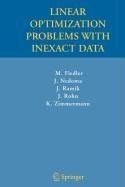Articoli correlati a Linear Optimization Problems with Inexact Data

Sinossi
Linear programming has attracted the interest of mathematicians since World War II when the first computers were constructed. Early attempts to apply linear programming methods practical problems failed, in part because of the inexactness of the data used to create the models. This book presents a comprehensive treatment of linear optimization with inexact data, summarizing existing results and presenting new ones within a unifying framework.
Le informazioni nella sezione "Riassunto" possono far riferimento a edizioni diverse di questo titolo.
Review
From the reviews:
"The authors have recollected here their results that were published in various journals, research reports and proceedings, mainly between 1994 and 2000. ... This research monograph is aimed at the audience interested in optimization, operations research, linear algebra and fuzzy sets." (S. Zlobec, Mathematical Reviews, Issue 2007 b)
From the Back Cover
Linear programming attracted the interest of mathematicians during and after World War II when the first computers were constructed and methods for solving large linear programming problems were sought in connection with specific practical problems―for example, providing logistical support for the U.S. Armed Forces or modeling national economies. Early attempts to apply linear programming methods to solve practical problems failed to satisfy expectations. There were various reasons for the failure. One of them, which is the central topic of this book, was the inexactness of the data used to create the models. This phenomenon, inherent in most pratical problems, has been dealt with in several ways. At first, linear programming models used "average” values of inherently vague coefficients, but the optimal solutions of these models were not always optimal for the original problem itself. Later researchers developed the stochastic linear programming approach, but this too has its limitations. Recently, interest has been given to linear programming problems with data given as intervals, convex sets and/or fuzzy sets. The individual results of these studies have been promising, but the literature has not presented a unified theory. Linear Optimization Problems with Inexact Data attempts to present a comprehensive treatment of linear optimization with inexact data, summarizing existing results and presenting new ones within a unifying framework.
Audience
This book is intended for postgraduate or graduate students in the areas of operations research, optimization theory, linear algebra, interval analysis, reliable computing, and fuzzy sets. The book will also be useful for researchers in these respective areas.
Le informazioni nella sezione "Su questo libro" possono far riferimento a edizioni diverse di questo titolo.
- EditoreSpringer
- Data di pubblicazione2008
- ISBN 10 0387512470
- ISBN 13 9780387512471
- RilegaturaPaperback
- LinguaInglese
- Numero di pagine232
- Contatto del produttorenon disponibile
(nessuna copia disponibile)
Cerca: Inserisci un desiderataNon riesci a trovare il libro che stai cercando? Continueremo a cercarlo per te. Se uno dei nostri librai lo aggiunge ad AbeBooks, ti invieremo una notifica!
Inserisci un desiderata
